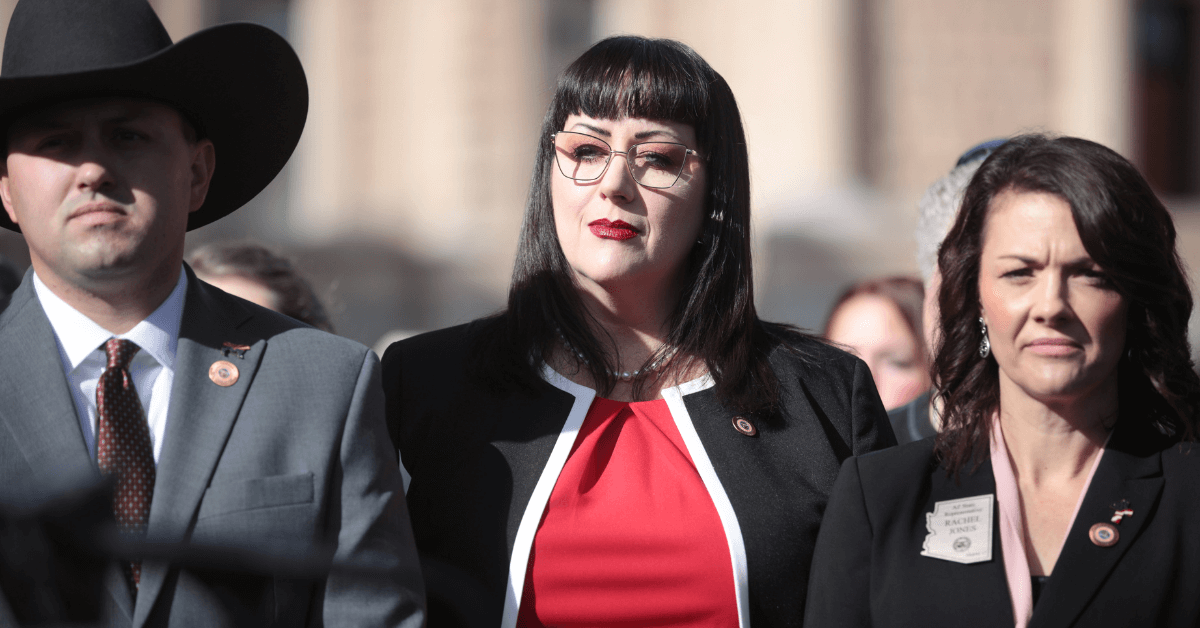
Photo by Gage Skidmore
One legislator said the push was part of a concerted effort by the far-right to attack the LGBTQ community.
A pair of bills that aim to ban or restrict drag performances in Arizona is one step closer to becoming law Wednesday morning after state Republicans passed the duo along party lines.
The first proposal, Senate Bill 1698, would expand what the state considers a sexually explicit business to any establishment that allows nude or semi-nude performances.
Broad Definitions, Unclear Scope
Under this proposal, drag shows—or any establishment that hosts a drag performance, such as a coffee shop or book store—would be considered an “adult-oriented business” and would be prohibited from allowing minors on its premises.
RELATED: Here Are the Bills Gov. Katie Hobbs Is Set to Veto
But SB 1698, proposed by Tucson Republican Sen. Justine Wadsack, has broad language that could lead to unintended consequences. The first-term state senator has already amended the bill once, as its original language could have left parents who let their children watch the Disney movie “Mulan” with a class 4 felony charge.
As it stands, minors would not be allowed in businesses during a performance that includes participants who:
- Dress in clothing and use makeup and other physical markers opposite of the performer’s or group of performers’ genders at birth to exaggerate gender signifiers and roles.
- Engage in singing, dancing, or a monologue or skit in order to entertain an audience of two or more people.
Such a law would prohibit minors from attending performances including several Shakespearean plays and drag performer story readings. During the committee meeting, Phoenix Democratic Rep. Analise Ortiz noted that the bill could also allow for law enforcement to arrest someone solely based on how they’ve dressed.
A companion bill, Senate Bill 1026, was introduced by Fountain Hills Republican Sen. John Kavanagh, which would limit where drag performances could be held. The bill aims to prohibit any person or business that accepts government funding from hosting an all-ages performance where “performers dress in clothing and makeup opposite of the performer’s or group of performers’ gender at birth.”
Where do They Stand?
Both SB 1698 and SB 1026 passed along party lines in the state Senate earlier this year and passed through state House committees on March 22. If passed, both are expected to be vetoed by Democratic Gov. Katie Hobbs.
Arizona Senate Republicans have introduced two other bills targeting drag performances this year: one that would broadly redefine “explicit performances” to include drag and possibly comedy shows, and another that would prohibit “adult cabaret” performances from any location where the performance could be viewed by a minor.
While Republicans have argued that the intention of anti-drag bills was to protect children from witnessing performances that they felt were not age-appropriate, Ortiz pointed out during Wednesday’s committee meeting that what their proposals really did was incorrectly imply that the art of drag is pornographic or sexual in nature.
“There’s misinformation from the other side of the aisle that’s making it seem as though it’s currently not illegal to take a kid to a strip club. It is currently illegal,” Democratic Phoenix Rep. Analise Ortiz said during the committee meeting. “We have seen a concerted effort across this nation of far-right elected officials—including in Tennessee—attacking artistic expression and targeting an art form with historical significance to the LGBTQ+ community.”
What Is Drag?
The art form has been cast in a false light in recent months by right-wing activists and politicians who complain about the “sexualization” or “grooming” of children. Opponents often coordinate protests at drag events that feature or cater to children, sometimes showing up with guns.
Performers and organizers of events, such as story hours in which colorfully clad drag queens read books to children, say the protesters are the ones terrorizing and harming children and making them political pawns — just as they’ve done in other campaigns around bathroom access and educational materials.
The recent headlines about disruptions of drag events and their portrayal as sexual and harmful to children can obscure the art form and its rich history.
Drag is the art of dressing and acting exaggeratedly as another gender, usually for entertainment such as comedy, singing, dancing, lip-syncing, or all of the above.
Drag may trace its roots to the age of William Shakespeare, when female roles were performed by men. The origin of the term is debated, but one possibility is that it was coined after someone noticed the dresses or petticoats that male actors wore onstage would drag along the floor.
Another casts it as an acronym — an unproven notion that notes in scripts would use “DRAG” to indicate the actor should “dress as a girl.”
RELATED: School Board Met With Personal Attacks After Cutting Ties With Anti-LGBTQ University
Many drag opponents cite nudity in their objections. Every performer makes different choices, but drag queens often wear more, not less, clothing than you’d see on a typical American woman of the 21st century, at a public beach, or on network TV.
Their costumes tend toward extravagant, sometimes floor-length gowns. Drag queens may use false breasts, wear sheer costumes, and use makeup or other means to show cleavage and appear exaggeratedly feminine.
The difference, performers note, is that opponents of drag see sexual deviance in the cross-dressing aspect.
Drag does not typically involve nudity or stripping, which are more common in burlesque, a separate form of entertainment. Explicitly sexual and profane language is common in performances meant for adult audiences. Such routines can consist of stand-up comedy that may be raunchy — or may pale in comparison with some mainstream comedians.
Looking for the latest Arizona news? Sign up for our FREE daily newsletter.
Support Our Cause
Thank you for taking the time to read our work. Before you go, we hope you'll consider supporting our values-driven journalism, which has always strived to make clear what's really at stake for Arizonans and our future.
Since day one, our goal here at The Copper Courier has always been to empower people across the state with fact-based news and information. We believe that when people are armed with knowledge about what's happening in their local, state, and federal governments—including who is working on their behalf and who is actively trying to block efforts aimed at improving the daily lives of Arizona families—they will be inspired to become civically engaged.


He said what? 10 things to know about RFK Jr.
The Kennedy family has long been considered “Democratic royalty.” But Robert F. Kennedy, Jr.—son of Robert F. Kennedy, who was assassinated while...

Here’s everything you need to know about this month’s Mercury retrograde
Does everything in your life feel a little more chaotic than usual? Or do you feel like misunderstandings are cropping up more frequently than they...

Arizona expects to be back at the center of election attacks. Its officials are going on offense
Republican Richer and Democrat Fontes are taking more aggressive steps than ever to rebuild trust with voters, knock down disinformation, and...

George Santos’ former treasurer running attack ads in Arizona with Dem-sounding PAC name
An unregistered, Republican-run political action committee from Texas with a deceptively Democratic name and ties to disgraced US Rep. George Santos...





